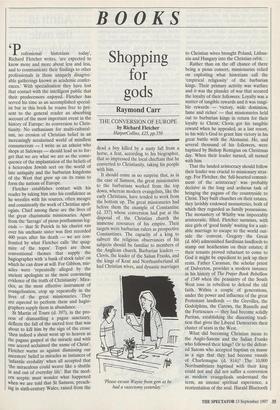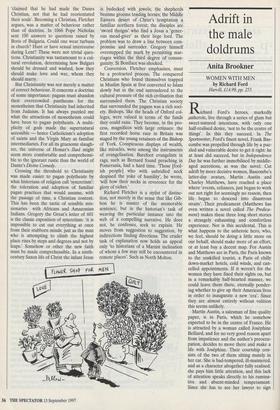BOOKS
Shopping for gods
Raymond Carr
THE CONVERSION OF EUROPE by Richard Fletcher HarperCollins, £25, pp.550
cp
rofessional historians today', Richard Fletcher writes, 'are expected to know more and more about less and less, and to communicate their findings to other professionals in those uniquely disagree- able gatherings known as academic confer- ences.' With specialisation they have lost that contact with the intelligent public that their predecessors enjoyed. Fletcher has served his time as an accomplished special- ist but in' this book he roams free to pre- sent to the general reader an absorbing account of the most important event in the history of Europe: its conversion to Chris- tianity. No enthusiasm for multi-cultural- ism, no erosion of Christian belief in an increasingly secularised world of mindless consumerism — I write as an atheist who shops at Safeways — should lead us to for- get that we are what we are as the conse- quence of the implantation of the beliefs of a heterodox Jewish sect on the world of late antiquity and the barbarian kingdoms of the West that grew up on its ruins to form the nations of Europe.
Fletcher establishes contact with his reader by taking him into his confidence as he wrestles with his sources, often meagre and consistently the work of Christian apol- ogists. Chief among these are the lives of the great charismatic missionaries. Apart from the 'farrago' of pious posthumous leg- ends — that St Patrick in his chariot ran over his unchaste sister was first recorded 400 years after his death — we are con- fronted by what Fletcher calls 'the quag- mire of the topos'. Topoi are those conventional themes that supply the hagiographer with 'a bank of stock tales' on which he can draw at will. For Gibbon, mir- acles were 'repeatedly alleged by the ancient apologists as the most convincing evidence of the truth of Christianity'. Mira- cles, as the most effective instrument of evangelisation, crop up repeatedly in the lives of the great missionaries. They are expected to perform them and hagio- graphers supply them in abundance. St Martin of Tours (d. 397), in the pro- cess of dismantling a pagan sanctuary, deflects the fall of the sacred tree that was about to kill him by the sign of the cross: `then indeed a shout went up to heaven as the pagans gasped at the miracle and with one accord acclaimed the name of Christ'. Fletcher warns us against dismissing our ancestors' belief in miracles as instances of `infantile credulity' when all accepted that `the miraculous could weave like a shuttle in and out of everyday life'. But the mod- ern sceptic must wonder what happened when we are told that St Samson, preach- ing in sixth-century Wales, raised from the dead a boy killed by a nasty fall from a horse, a feat, according to his biographer, that so impressed the local chieftain that he converted to Christianity, taking his people with him.
It should come as no surprise that, as in the case of Samson, the great missionaries to the barbarians worked from the top down, whereas modern evangelists, like the early Christians, have tended to work from the bottom up. The great missionaries had before them the example of Constantine (d. 337) whose conversion had put at the disposal of the Christian church the immense resources of his empire. Their targets were barbarian rulers as prospective Constantines. The capacity of a king to subvert the religious observances of his subjects should be familiar to members of the Anglican church. Barbarian leaders Clovis, the leader of the Salian Franks, and the kings of Kent and Northumberland all had Christian wives, and dynastic marriages Please excuse Wayne from gym as he had a vasectomy yesterday.' to Christian wives brought Poland, Lithua- nia and Hungary into the Christian orbit.
Rather than on the off chance of there being a pious consort, missionaries relied on exploiting what historians call the `empirical religiosity' of the barbarian kings. Their primary activity was warfare and it was the plunder of war that secured the loyalty of their followers. Loyalty was a matter of tangible rewards and it was tangi- ble rewards — 'victory, wide dominion, fame and riches' — that missionaries held out to barbarian kings in return for their loyalty to Christ; Clovis got his tangible reward when he appealed, as a last resort, to his wife's God to grant him victory in his great battle with the Alemanni. He, and several thousand of his followers, were baptised by Bishop Remigius on Christmas day. When their leader turned, all turned with him.
That the landed aristocracy should follow their leader was crucial to missionary strat- egy. For Fletcher, the 'full-hearted commit- ment of the aristocracy' was probably decisive in the long and arduous task of bringing the pagans of the countryside to Christ. They built churches on their estates, they lavishly endowed monasteries, both of which they regarded as family possessions. The monastery of Whitby was impeccably aristocratic, filled, Fletcher surmises, with nice girls of 'good family' waiting for a suit- able marriage to escape to the world out- side the convent. Gregory the Great (d. 604) admonished Sardinian landlords to stamp out heathenism on their estates; if their tenants proved reluctant to come to God it might be expedient to jack up their rents. Father Caraman, the scholar priest of Dulverton, provides a modern instance in his history of The Prayer Book Rebellion of 1549 when the peasantry of the South West rose in rebellion to defend the old faith. Within a couple of generations, under the power and influence of the great Protestant landlords — the Grevilles, the Godolphins, the Carews, the Russells and the Fortescues — they had become solidly Puritan, establishing the dissenting tradi- tion that gives the Liberal Democrats their cluster of seats in the West.
What did becoming Christian mean to the Anglo-Saxons and the Salian Franks who followed their kings? Or to the defeat- ed Saxons who accepted baptism en masse as a sign that they had become vassals of Charlemagne (d. 814)? The 10,000 Northumbrians baptised with their king could not and did not suffer a conversion as modern evangelicals understand the term, an intense spiritual experience, a reorientation of the soul. Harald Bluetooth `claimed that he had made the Danes Christian, not that he had reorientated their souls'. Becoming a Christian, Fletcher argues, was a matter of behaviour rather than of doctrine. In 1066 Pope Nicholas sent 100 answers to questions raised by Boris of Bulgaria. Could one wear turbans in church? Hunt or have sexual intercourse during Lent? These were not trivial ques- tions. Christianity was tantamount to a cul- tural revolution, determining how Bulgars should be dressed and washed, how they should make love and war, whom they should marry.
But Christianity was not merely a matter of correct behaviour. It concerns a doctrine of some importance: pagans must abandon their overcrowded pantheons for the monotheism that Christianity had inherited from Judaism. It has always puzzled me what the attractions of monotheism could have been to pagan polytheists. A multi- plicity of gods made the supernatural accessible — hence Catholicism's adoption of saints and the Virgin Mary as familiar intermediaries. For all its gruesome slaugh- ter, the universe of Homer's Iliad might seem more comfortable and comprehensi- ble to the ignorant rustic than the world of Dante's Divine Comedy.
Crossing the threshold to Christianity was made easier to pagan polytheists by what historians of religion call 'syncretism': the toleration and adoption of familiar pagan practices that would assume, with the passage of time, a Christian content. This has been the tactic of sensible mis- sionaries with Africans and Amazonian Indians. Gregory the Great's letter of 601 is the classic exposition of syncretism: 'it is impossible to cut out everything at once from their stubborn minds: just as the man who is attempting to climb the highest place rises by steps and degrees and not by leaps.' Somehow or other the new faith must be made comprehensible. In a ninth- century Saxon life of Christ the infant Jesus is bedecked with jewels; the shepherds become grooms tending horses; the Middle Eastern desert of Christ's temptation a familiar northern forest; the disciples are `sword theigns' who find a Jesus a 'gener- ous mead-giver' as their liege lord. The problem was to draw a line between com- promise and surrender. Gregory himself overstepped the mark by permitting mar- riages within the third degree of consan- guinity. St Boniface was shocked.
Conversion, Fletcher emphasises, must be a protracted process. The conquered Christians who found themselves trapped in Muslim Spain at first converted to Islam slowly but in the end surrendered to the cultural pressure of the rich civilisation that surrounded them. The Christian society that surrounded the pagans was a rich soci- ety. Bishops, like the heads of Oxford col- leges, were valued in terms of the funds they could raise. They become, in the pro- cess, magnificos with large retinues: the first recorded horse race in Britain was staged by the young retainers of the Bishop of York. Conspicuous displays of wealth, like miracles, were among the instruments of evangelisation. Barefoot evangelists in rags, such as Bernard found preaching in Pomerania, had a hard time. 'Those [fool- ish people] who with unbridled neck despised the yoke of humility', he wrote, `will bow their necks in reverence for the glory of riches.'
Richard Fletcher is a stylist of distinc- tion, not merely in the sense that like Gib- bon he is master of the memorable sentence, but in the historian's task of weaving the particular instance into the web of a compelling narrative. He does not, he confesses, seek to explain. He moves from suggestion to suggestion, by indirections finding directions. The cruder task of explanation now holds an appeal only 'to historians of a Marxist inclination of whom a few may still be encountered in remote places'. Such as North Molton.



































































 Previous page
Previous page